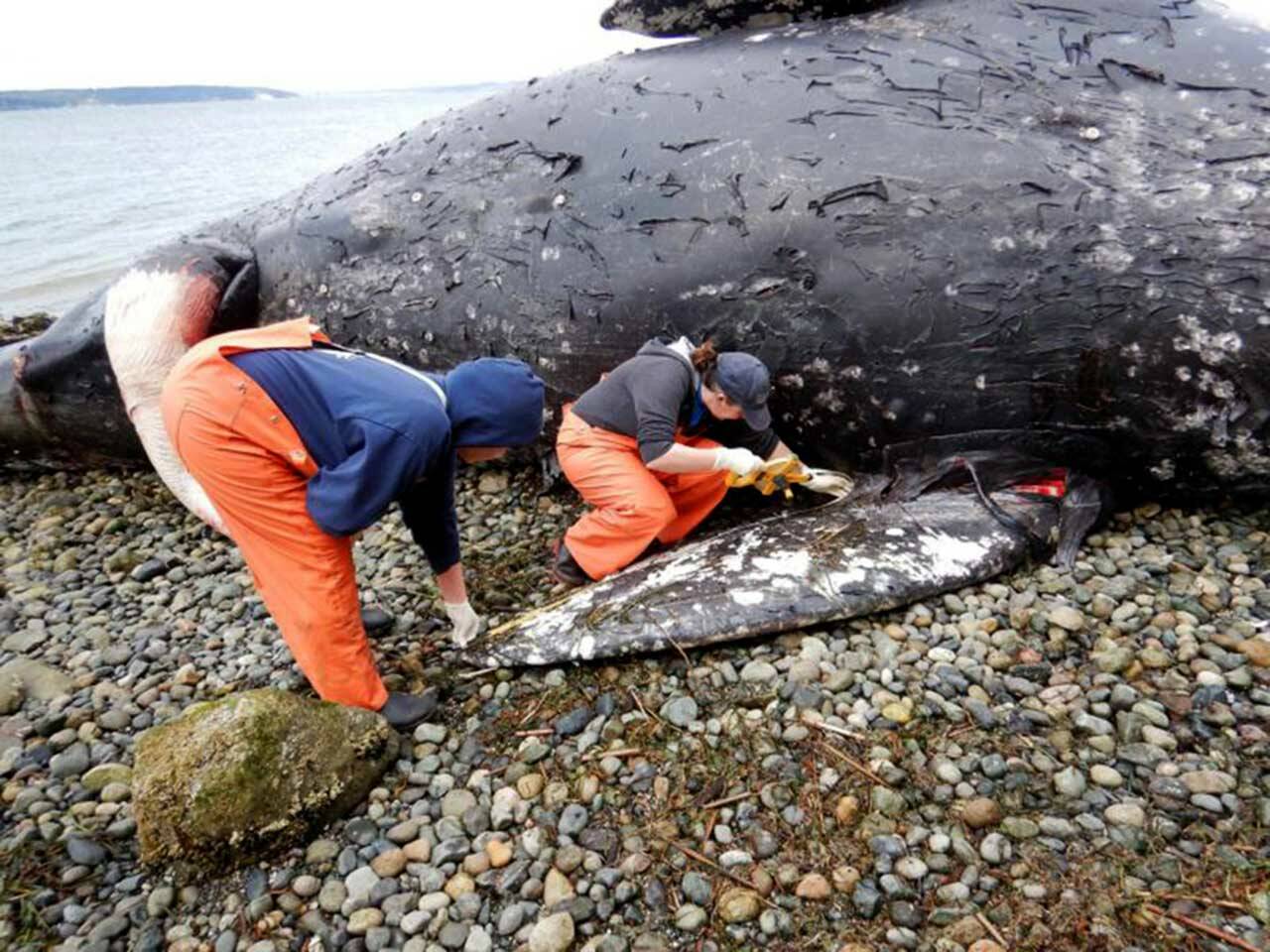CAMANO ISLAND — After a dead gray whale washed ashore on northwest Camano Island late last month, the plan was to let the massive mammal decompose naturally on the beach, away from nearby homes.
Last week, though, the Central Puget Sound Marine Mammal Stranding Network had to find a new solution after storms washed the carcass closer to neighbors.
The carcass had been secured to large logs on the beach, but the rope became severed, according to the nonprofit Orca Network, part of the response team. Waves pushed the whale to a section of beach right next to homes, said Susan Berta, co-founder of the Orca Network.
“Because it’s a fairly shallow beach, and the way the tides are, we could not get a boat in” to move it, she said.
Berta said the new plan is leave the carcass where it is, while applying agricultural lime to speed decomposition and control smell. The same application was used on a dead whale on Whidbey Island, and the carcass was gone in two to three months, she said.
“We’ve been trying — we know people are not happy,” Berta said. “Our stranding response coordinator and I have spent hundreds of hours trying to coordinate with other agencies.”
Camano Island residents discovered the beached whale March 31, and biologists performed a necropsy on April 2, according to a Monday news release from the Orca Network.
The 39-foot adult male appeared to be malnourished, though researchers were unable to say for certain a cause of death, the Cascadia Research Collective wrote in an online post. Tissues will be analyzed further.
The animal weighed an estimated 30,000 to 40,000 pounds.
The Camano Island whale is the latest in an ongoing unusual mortality event for gray whales along the West Coast and Alaska. It began in 2019, when 34 gray whales were found dead on beaches around the state, according to NOAA data. Since then, gray whale strandings have declined each year.
The Camano Island whale is the third gray whale found dead this year, according to NOAA.
About 20,000 gray whales migrate annually from Mexico to feeding grounds in the Arctic. Some are frequent visitors to Puget Sound, where they feed on ghost shrimp at high tide along rocky shores, said John Calambokidis, a biologist with the Cascadia Research Collective.
The group of about 20 whales that detour to Puget Sound each year are called Sounders, he said. The whale found dead on Camano Island was not part of the local Sounders group.
He said the whale likely traveled to inland waters for food — but it was too late.
“It may have been a prospective Sounder, and it ended up being a malnourished straggler we see in years where there are prey limitations for the gray whales,” he said.
Calambokidis said gray whale strandings have declined but are still elevated.
“It’s not down to normal yet,” he said. “Most of the mortality we see occurs in the spring.”
The unusual deaths are still unexplained, but are “likely an interplay of a growing gray whale population and a limited food supply,” Calambokidis said.
On Camano Island, the stranding network asks the public to stay away while the whale carcass decomposes.
It’s a federal crime to remove marine mammal parts from the beach without a permit, and coming into contact with the carcass can transmit disease, according to an Orca Network news release.
With little funding, the network often relies on volunteers for help, Berta said. The group is thankful for the support of several nearby homeowners.
“We all love living on the water. Your yard is the edge of the ocean,” she said. “When larger animals die on the beach, they stay there, and they go back to nature and different critters feed on them.”
How to report a stranding
To report dead or stranded marine mammals in Island, Skagit and Snohomish counties, call 1-866-ORCANET, or
Jacqueline Allison:



